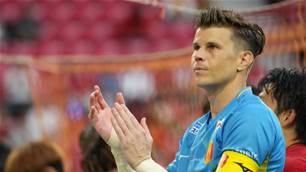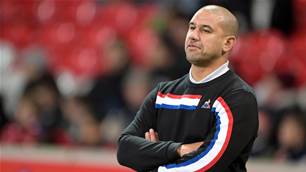Dual Socceroos/Olyroos Head Coach Graham Arnold has issued a stark warning to Australian football: it needs to give young players somewhere to play or risk losing them forever.
Arnold’s Olyroos ended a 12-year absence from the Olympics by recording a 1-0 win over Uzbekistan in the early hours of Sunday morning, Nick D’Agostino’s 47th-minute strike proving enough to secure the AFC’s third and final spot at the Games of the XXXII Olympiad on offer.
The goal that sealed the U-23's place at #Tokyo2020! 🇯🇵
— Socceroos (@Socceroos) January 26, 2020
🎥: @FoxFootball #TokyoTogether pic.twitter.com/VwaXFhB1u2
At a base level, the securement of passage to Tokyo represents a goal achieved for the Olyroos – one that the players involved can be proud of.
With little preparation time, a number of key players either missing or suspended, rapid turnarounds and oppressive conditions to contend with, Arnold's side demonstrated ability to grind out results and succeed where other sides have failed.
They will now get a chance to earn the title of Olympic Athlete - a label that only an elite few athletes will ever achieve and marker that carries with it millennia of historical significance.
But whether the hard-fought results won in Thailand are able to be replicated against better quality opposition on a grander stage is a debatable matter – was qualification for the Olympics the goal or just one step on a road to an Olympic medal?
Is the goal of the Olyroos to win? Or is it to play good football?
For while qualification was achieved, the nature of the accomplishment still left room for improvement.
Despite losing just a single game all tournament, Australia couldn’t be said to have come close to dominating, or even controlling, any game in Thailand over the past month.
The only moments where the Olyroos seemed to be taking a game on by the scruff of the neck arrived in the second half of their fixture against the host nation and in extra-time against Syria – two occasions in which the opposition had clearly run out of petrol.
As has become somewhat of a theme for Australian sides in international competition, a lack of penetration, composure and creativity in the attack led to a dearth of clear-cut goalscoring opportunities throughout the tournament – and there was frequent trepidation when players were forced to act in the face of an opposition press.
Eventually, a comprehensive 2-0 outclassing at the hands of South Korea in the semi-finals demonstrated just what gap exists between the Olyroos and Asia’s finest.
Making matters difficult for the 23-player squad in Thailand before a ball had even been kicked was, especially when compared to that of their rival nations, the lack of minutes afforded to young players within the current Australian setup.
Whereas established powers such as the Koreans are able to call up youngsters that are frequent contributors on the domestic front, the contributions that Australia’s best and brightest U23 players make at clubland can charitably be described as sporadic.
It’s a lack of minutes that not only denies youngsters developmental opportunities in the most valuable training environment – that of a live game – but also creates a self-perpetuating cycle of youngster's skills and instincts being blunted by a lack of game time and them subsequently then not receiving A-League minutes because of their blunt skills and instincts.
Speaking to journalists via a phone hook-up on Sunday afternoon, Arnold, as he has done on numerous occasions since taking on Olyroos responsibilities, bemoaned a lack of playing opportunities for young players and the challenges it created for them both physically and mentally.
“I showed the boys last night after the game when we got back to the hotel,” Arnold began.
“I showed them a two- or three-minute documentary on Aaron Mooy and his career. When he was 21-22, he didn't play at the Olympics, he wasn't playing overseas in Scotland, he came back to the Wanderers and look where he is today.
“It's all about playing and if you don't play at this age group, your career will be over within a very quick and a very short time.
“If you're playing and playing regularly then you can have a great journey in life and that's why I do believe in these kids. The hardest thing I had to do with this job when I took over was to fix their brains because the kids have no belief or self-confidence.
“[Against Uzbekistan], if you want to talk about performance, it wasn't a great performance, it was a good, fighting performance.
“How many of those kids have ever been on the stage before and experienced that type of situation? Maybe Thomas Deng is the only player that's ever played in a bigger game - or any game of that stature in a grand final in the A-League. All those other kids, none.
“We had a couple of players that I believe through this tournament suffered from anxiety and couldn't play the game. [They] either fell ill or felt ill during the game and had to be taken off.
“That's because they're not used to playing and they're not used to experiencing these experiences.
“When you're sitting in a hotel for three days and you're waiting for this game, they all knew the importance of the game, they all knew what the game meant but they hadn't experienced that before. How to prepare for it, what to do.
“My voice is gone [Arnold was almost unintelligibly hoarse on the call] because of the amount of talking I was doing to those kids to keep them relaxed and to not be a coach, more of a father figure to them.”
Ultimately, there are a number of different options that can be taken to provide young players with opportunities to play at the highest level.
One road lies with the creation of a national second division and a reforming of the league structure to allow for the introduction of transfer fees throughout the Australian pyramid.
If properly implemented and managed, such a move would not only open up a number of professional playing opportunities that could be filled by young players but also incentivise clubs to develop and play their youth to gain both an affordable competitive advantage and in the hopes of cashing in on them with a sale to a club overseas or in Australia.
The subject of an FFA white paper in 2019, head of a working group looking at the establishment of a national second division Remo Nogarotto and new FFA CEO James Johnson recently met with PFA Chief Executive John Didulica and Christo Patsan and Nick Galatas from the Australian Association of Football Clubs Association of Australian Football Clubs.
Good meeting today between Nick Galatas & @christopatsan of AAFC with @RNogarotto & @jjJamesJohnson of FFA & John Didulica of @thepfa about the National Second Division. Next steps to be announced soon.
— AAFC (@AAFClubs) January 22, 2020
Another possibility, one championed by Arnold, is the creation of a reserve grade competition linked to the A-League.
Such a format would provide youngsters contracted to A-League clubs such as Ramy Najjarine, Denis Genreau and Tass Mourdoukoutas opportunities to play when not selected for their club’s senior sides.
“A meaningful reserve grade competition of 20-odd games where the kids get to play,” Arnold said when asked of his vision for a reserve grade.
“If these kids are deemed not good enough for the A-League, which is no problem - coaches make their decisions, give the kids over the age of 20 somewhere to play.
"An open age [competition] with regulations that the foreigners that don’t play [in the A-League] on weekends, instead of them laying on Bondi Beach, make them play in the reserve grade competition to help them develop our players.
“An eight-game [Y-League] does nothing to develop them.
“What needs to happen, is that these kids need to play and if they’re not good enough for the A-League than give them a reserve grade competition.
“All over the world, there’s reserve grade competitions in a professional environment with the resources of professionals so they can develop and become great players.”
Header Image Credit: Asian Football Confederation
Related Articles
.jpeg&h=172&w=306&c=1&s=1)
Socceroos prodigy returns to A-League after horror run

Star keeper's exit heralds hero's return at A-League giant













